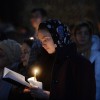Source: American Carpatho-Russian Orthodox Diocese of the USA
Now it came to pass, as He was praying in a certain place, when He ceased, that one of His disciples said to Him, “Lord, teach us to pray, as John also taught his disciples” (St. Luke 11:1).
This particular passage from the Gospel of St. Luke is the introduction to the Lord’s Prayer, which Jesus provides as the answer to this request. But it is significant to note that the person asking to be taught how to pray is not one of the passers by, but rather, “one of His disciples.”
The truth is that while it would seem that prayer should be the most natural of things, it is often the most difficult – even for the Disciples of Christ! Talking with God sometimes seems like talking to someone that we are out with on a first date. We are awkward and seek carefully for the right words to try to impress and not offend – if we can find the words at all!
It probably would not be too inaccurate to say that for many people prayer is something that they seldom do outside of the confines of the Church. Even then, it is often limited to the responses in liturgical services or a cursory recitation of the “Our Father” and “Hail Mary.” It seems that for too many people, when the time comes to pray, we revert back to that small child who was instructed in how to make his or her First Confession – look how many prayer books have their spines broken only on the Prayers before and after Confession – and we are simply unable to move beyond that point.
This is tragic because the Father Himself expects us to pray, following the example of His Son Who is frequently seen at prayer in the pages of the New Testament.
Jesus told his followers in the Gospel and still tells us today:
No longer do I call you servants, because a servant does not know his master’s business. Instead, I have called you friends, for everything that I learned from My Father I have made known to you. You did not choose Me, but I chose you and appointed you to go and bear fruit-fruit that will last. Then the Father will give you whatever you ask in My name (John 15:15-16).

The Lord gives us the intimacy, the friendship that we need to approach Him in prayer, and waits for us to do so. What we lack so often is not the desire but the method of accomplishing our goal of having a vibrant prayer life.
Whole forests have been cut down to provide paper to print many thousands of books about the subject of “how to pray.” The simple response of Jesus in the Gospel has been magnified and multiplied by a thousand generations of seekers and teachers with no end in sight. The desire to know God is innate in every human being, even in those who deny the existence of God and try to stifle the call in their hearts.
We must first begin by realizing that prayer is not foreign to us. When we were infants, before our cognitive abilities developed, we were daily in God’s presence. Many of us, at the end of our lives, when old age causes those abilities to fail, will find ourselves daily in God’s presence again. Prayer is nothing more and nothing less than the rediscovery of that Divine Presence in the lifetime that exists between those two moments.
What has hindered us in prayer is the mental clutter that we have accumulated in our lives: our pride, our sins, our bad choices (and even our good ones), our constant grasping for money. All of these things have stilled the voice of prayer within us. We must now work to hear it once again.
The majority of us begin to pray with a prayer book, which is an excellent place for us to start. Because of our inability to express ourselves, the Church has taken prayers of others, some of them well known figures like St. John Chrysostom and St. Basil the Great, and some who remain anonymous, and has given them to us as a starting point for our prayer.
There are some unhappy voices who condemn the practice of “praying other people’s prayers” but in saying this they condemn the practice of Jesus Himself. In His earthly life the Saviour used the “prayers of other people” on a regular basis. In fact, one of the last prayers He uttered was by His famous ancestor, King David:
About the ninth hour Jesus cried out in a loud voice, “Eloi, Eloi, lama sabachthani?”-which means, “My God, my God, why have you forsaken me?”
While hanging on the Cross, Jesus prayed the first verse of Psalm 22, a Psalm regarded as a Messianic Psalm. From His childhood, Jesus was raised with “other people’s prayers” such as those found in the Book of Psalms as well as in the Synagogue services that formed a part of His daily life and that of the Apostles.
The use of established prayers and Psalms in our prayer life is like a sail on a ship – they provide a strong fabric to catch the wind of the Spirit and move us in the right direction. They provide a bond of unity with the generations past and those yet to be born.
One of the reasons that the spiritual life among our Western brothers and sisters is in such a deep crisis is that they relegated to the trash heap their traditional prayers. In an attempt to be relevant to today’s world, they replaced these traditional prayers, which we based on the spiritual experience and the witness of the Holy Spirit in the life of the Church over the last two thousand years, with “Prayers by Committee.” The result has been mundane at best and spiritually stifling at worst.
Certainly our prayer life must be grounded in the traditional prayers and services of the Church. However, they were never intended to be the sum total of our prayer life but the beginning of it. They are the map and guideposts to the realm of the Holy Spirit – essential, but we should not mistake the map for the territory itself!
The prayers that we find in the prayer books today were not purposely written for them. They were the simply private prayers of individuals that the Church adopted as reflections of the desires and needs of Her children.
In addition to writing down their prayers, many of the Fathers and writers in the Early Church wrote about prayer. One of the best works to survive and come down to us was written by a prolific third century writer named Origen.
Origen lived in the cosmopolitan city of Alexandria in Egypt where there was a large Christian community. Later in life, he moved to the town of Caesarea in Palestine. As a young man of seventeen, during a fierce persecution of the Church, he attempted to seek arrest and martyrdom. His mother saved his life only by hiding his clothes!
Origen was famous in his lifetime as a Biblical Scholar, as a theologian and teacher and as a man of prayer. Although some of his theological opinions were somewhat unfairly judged to be unsound by generations centuries removed from him, he was generally widely respected during his lifetime as a churchman without peer.
In response to a request from one of his admirers, Origen wrote a small book entitled, On Prayer, which is still helpful today for those who are seeking to develop a method of “how to pray” and put their desire into action. Later Church Fathers such as St. Basil the Great and St. Gregory the Theologian were fond of this work because it was filled with practical and useful information for anyone desiring a better prayer life.
Origen notes that prayer requires that certain conditions be fulfilled before one can benefit from the experience:
Just as, apart from woman and apart from recourse to the function requisite for procreation, man cannot procreate, so one may not obtain certain things without prayer in a certain manner, with a certain disposition, with a certain faith, after a certain way of life that must precede prayer.
In other words, prayer demands faith, a faith based way of life and an emotional and spiritual disposition that is in keeping with the Gospel. Prayer is serious business. It is our conversation with our heavenly Father to Whom access has been granted by the Cross and Resurrection of our Lord Jesus Christ. We cannot approach it lightly or casually. Prayer is the conduit through which repentant sinners (not casual ones) receive God’s grace.
Thus we are not to babble or ask for little things or pray for earthly things or enter upon prayer with anger and with thoughts disturbed.
How many times are priests asked to bless lottery tickets and bingo cards with the solemn promise, “Father, if God answers my prayer and lets me win, I’ll give such and such an amount to the Church!” Aside from the sin of “tempting God” (Notice that no one ever says I’ll give it all to the Church!), such prayers proceed from the notion that God can be manipulated or bought. All such prayers are not expressions of love for our Creator but ultimately show contempt for Him. Prayer must be based on the trust that God loves us more than we ourselves know how to love Him in return and that He grants to us all that is needed for salvation, whether it be wealth or poverty, health or sickness, fame or anonymity, blessings or trials.
Origen continues:
Nor again is it possible to think of giving oneself to prayer apart from purification. Nor again is forgiveness of sins possible to the person praying unless from the heart he forgives his brother who has done wrong and entreats him to obtain his pardon.
He reflects here the words of the Saviour in the Gospel:
Therefore if you bring your gift to the altar, and there remember that your brother has something against you, leave your gift there before the altar, and go your way. First be reconciled to your brother, and then come and offer your gift (Matthew 5:23-24).
The holy martyr Nicephorus had a very good friend named Sapricius. The two of them quarreled and were not speaking with each other. Sapricius was a priest and during the persecution of the Emperor Gallienus in 260 A.D., was arrested and sentenced to death for his faith. Nicephorus sent mutual friends to attempt reconciliation between himself and Sapricius before his death. But Sapricius refused to let go of his hatred and hurt feelings.
When the hour came to carry out the sentence, he renounced Christ and agreed to sacrifice to the idols, despite the pleas of Nicephorus not to give up the crown of martyrdom. Nicephorus came forward to the executioner to take the place of his former friend.
The hatred that Sapricius felt in his heart not only cost him his earthly friendship, but robbed him of the friendship of Christ, which prayer had earlier given him in his life.
We must begin to pray by striving as much as we can to empty ourselves of our hatreds, grudges, jealousies, pettiness and, most of all, our “hurt feelings.” It is our hurt feelings that are the most sinful expression of our pride. Jesus did not say on the Cross, “Father, I have hurt feelings,” but “Father, forgive them.”
In ending his little book, On Prayer, Origen gives a simple outline to organize our thoughts before we present them in prayer:
Four topics which I have found scattered throughout the Scriptures appear to me to deserve mention, and according to these everyone should organize their prayer. The topics are as follows: In the beginning and opening of prayer, glory is to be ascribed according to one’s ability to God, through Christ who is to be glorified with Him, and in the Holy Spirit who is to be proclaimed with Him. Thereafter, one should put thanksgivings: common thanksgivings-into which he introduces benefits conferred upon men in general-and thanksgivings for things which he has personally received from God.
After thanksgiving it appears to me that one ought to become a powerful accuser of one’s own sins before God and ask first for healing with a view to being released from the habit which brings on sin, and secondly for forgiveness for past actions.
After confession it appears to me that one ought to append as a fourth part the asking for the great and heavenly things, both personal and general, on behalf of one’s nearest and dearest. And last of all, one should bring prayer to an end ascribing glory to God through Jesus Christ in the Holy Spirit. As I already said, I have found these points scattered throughout the scriptures.
Simply put, according to Origen, Prayer should first begin with praise to God through Christ in the Holy Spirit; second, it should continue with thanksgiving for all of the blessings we have received; thirdly, there should be a confession of our sins and a desire for forgiveness; then fourth, a petition for blessings for our family, friends and those in need; it should end as it began with praise to the Father, Son and Holy Spirit, One God.
When we are moved to pray, this is a simple outline that we can remember and follow to help organize our thoughts and thus, our prayer.
Ultimately, the most important thing in discussing prayer is to pray! Everyone should strive to keep a “rule of prayer,” no matter how simple, and follow it every day. The older prayer books had simple rules of prayer such as the “Beginning Prayers” or simply “Our Father” and “Hail Mary” followed by repeating the Jesus Prayer a number of times. The Fathers tell us a simple rule that is easy to keep each day will be better than a lengthy one that is soon abandoned.
Prayer need not be confined to a specific hour but can occupy us whenever our mind is bored or tempted or is rejoicing.
As was mentioned in the beginning of this article, Jesus addressed the Apostles, and through them all believers, as His “friends.” Friendship with the Lord is no different than friendship with anyone else. It depends on mutual self-disclosure in order to be a solid friendship. We can achieve this through prayer, but it is also necessary to come to know Christ through an attentive reading of the Gospels, the Letters of the Apostles and the Psalms.
In the Liturgy we sing “The Lord is God and has revealed Himself to us!” It is on the pages of the New Testament that we find the details of this Self-revelation. Without allowing the Word of God to sink into our hearts, we will never make any real progress in our prayer life. St. John Chrysostom believed that the reading of Scripture was especially important to those of us who live in the world in order to help focus our energy on the Lord.
Prayer is the means for us to experience God and no one can love God without having experienced His grace and mercy. During the upcoming Lenten season, let us strive to renew our prayer life. The late Metropolitan Anthony Bloom in his classic book, Beginning to Pray,wrote that “Prayer begins in the absence of God.” Prayer will fill the emptiness, the loneliness, the despair within us, with the comfort of God’s presence and grace – if we resolve to make a beginning of it in our hearts everyday.
















